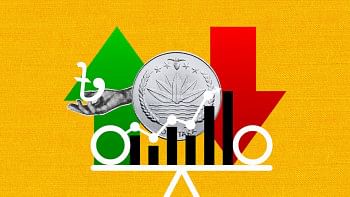Reasoning nothingness . . .
It was one of those days. Sitting on the patio looking at the blue sky through autumn's worn-out brown leaves, I drew a complete blank. Nothing came to mind. Well, I decided if my mind can think of nothing then perhaps I need to write about it. That became even more challenging. My mind couldn't conjure up nothing as my brain experienced no such thing. Ah, the magical will! I became more determined to understand what my mind refused to understand. The concept in question evoked several words: void, nonexistent, nothingness, blank, oblivion, naught. None resolved the dilemma. As a starting point I asked whether nothing should be treated as a value, an ideal in pursuit of knowledge. But again, that knowledge is relative to something. Or is it more tangible?As ascetics who denounce everything material in search of that void called nothing? I hungered for a clearer answer.
How about if I reason from a different angle? Following is a set of expressed emotions of two characters about whom I write often.
“Come join me in reaching for the stars.â€
“I need to start with smiles.â€
“After smiles let there be your sunshine laughter! You always give me a reason to love life as a metaphor for poetry.â€
“Then life must be beautiful.â€
“Yes, life is beautiful…for you are life, sustained by the poetry it contains.â€
These two characters have created a world for themselves; tangible in the sense that they laugh together, embrace each other without intimacy, feel the intensity of each other's presence, living on the edge between desire and memory. They have no precise story to begin with. For them the meaning of life is beyond fixed notions, to be alive in the unstable existence of freedom. They are aware of life in its totality of beauty and pain. Tomorrow for them does not exist unless I create the tomorrows. Can it be that if I stop writing about these two personalities it will wipe out their beings into nothing? But is it not true that even though my story begins from nothing it really is a combination of events encountered by my consciousness at some point, while I have moved beyond it. My motive to write as such is therefore found in the makeup of my consciousness, which is the desire to persevere. It indeed is of consequence. Thus by creating the story have I not experienced something of nothingness? This mode of reasoning is somehow beginning to take a meaningful shape!
The question now is whether nothing is a beginning or an end. Only time is the connector of nothingness linking birth and death, in between is life. The human mind at birth is a clean slate, tabula rasa: born into nothing. It is only after others sculpt the foundation of life that its content is developed by the person. In which case, then, the predetermined experience of others and later the person's own arrangements of experiences create the independent self. If so, this would indeed refute Pascal's saying of man being “incapable of seeing the nothingness from which he emerges.â€
Or does it mean that everything that ends results in nothing, like that final death? That inexplicable notion of nothing(ness) after death has compelled us to reach for the abstract heavens. We have even made it apprehensible to our senses - the ultimate place of beauty and peace, sublime and serene, just and right. A reachable world that becomes for us a source of continuity. The threshold of the unknown blurs in longing for a perfect hereafter!
In this effort to describe nothing I certainly did not wish to stir up the Epic of Gilgamesh, the very first recorded poem in history, in which the 'god-human' hero from Mesopotamia viewed life as empty upon realizing that he too would die like his friend Enkidu:
“The river rises, flows over its banks and carries us all away,
like mayflies floating downstream: they stare at the sun,
then all at once there is nothing.â€
His is the millennia-old story of deciphering mortality, which dissolves into the ultimate nothing. Throughout time, art, science, literature, philosophy all have dabbled in explaining nothing(ness), and certainly all have given us a treasure trove of thoughts to contemplate on.
As for me, this whole attempt at searching for this suspended meaning left a deep longing for a warm embrace, to feel the real. But as I turned around there was no one. Ironically, at that moment I realized I was indeed face to face with the real nothing.
And I heard Shakespeare sarcastically whisper, “Much ado about …!â€
Ainon N --- academic, critic and aesthete --- writes from Carbondale, Illinois, USA.

 For all latest news, follow The Daily Star's Google News channel.
For all latest news, follow The Daily Star's Google News channel. 



Comments